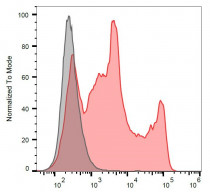ARG53952
anti-Intra Acrosomal Protein antibody [Hs-14] (FITC)
anti-Intra Acrosomal Protein antibody [Hs-14] (FITC) for Flow cytometry and Human,Mouse
Cell Biology and Cellular Response antibody; Controls and Markers antibody; Developmental Biology antibody; Signaling Transduction antibody
Overview
| Product Description | FITC-conjugated Mouse Monoclonal antibody [Hs-14] recognizes Intra Acrosomal Protein |
|---|---|
| Tested Reactivity | Hu, Ms |
| Tested Application | FACS |
| Specificity | The clone Hs-14 reacts with a 220 kDa testis-specific human intra-acrosomal protein associated with the membranes of the acrosomal vesicle._x000D_ |
| Host | Mouse |
| Clonality | Monoclonal |
| Clone | Hs-14 |
| Isotype | IgM |
| Target Name | Intra Acrosomal Protein |
| Antigen Species | Human |
| Immunogen | Freshly ejaculated human sperms were washed in PBS and extracted in 3% acetic acid, 10% glycerol, 30 mM benzaminidine. The acid extract was dialyzed against 0.2% acetic acid and subsequently used for immunization. |
| Conjugation | FITC |
| Alternate Names | D11S4365; Acrosomal vesicle protein 1; SP-10; Acrosomal protein SP-10; SPACA2 |
Application Instructions
| Application Suggestion |
|
||||
|---|---|---|---|---|---|
| Application Note | * The dilutions indicate recommended starting dilutions and the optimal dilutions or concentrations should be determined by the scientist. |
Properties
| Form | Liquid |
|---|---|
| Purification Note | The purified antibody is conjugated with Fluorescein isothiocyanate (FITC) under optimum conditions. The reagent is free of unconjugated FITC and adjusted for direct use. No reconstitution is necessary. |
| Buffer | TBS, 15 mM Sodium azide and 0.2% (w/v) high-grade protease free BSA |
| Preservative | 15 mM Sodium azide |
| Stabilizer | 0.2% (w/v) high-grade protease free BSA |
| Storage Instruction | Aliquot and store in the dark at 2-8°C. Keep protected from prolonged exposure to light. Avoid repeated freeze/thaw cycles. Suggest spin the vial prior to opening. The antibody solution should be gently mixed before use. |
| Note | For laboratory research only, not for drug, diagnostic or other use. |
Bioinformation
| Database Links | |
|---|---|
| Gene Symbol | ACRV1 |
| Gene Full Name | acrosomal vesicle protein 1 |
| Background | One of the most frequent causes of man infertility is defective sperm acrosome. This damage can be detected using antibodies against intra-acrosomal proteins. Besides diagnostics of sperm pathology, monoclonal antibodies against intra-acrosomal proteins can be used for evaluation of the physiological state of sperm cells as well as for selection of a suitable method of fertilization in the laboratories of assisted reproduction. |
| Research Area | Cell Biology and Cellular Response antibody; Controls and Markers antibody; Developmental Biology antibody; Signaling Transduction antibody |
| Calculated MW | 28 kDa |
Images (1) Click the Picture to Zoom In
Clone References








